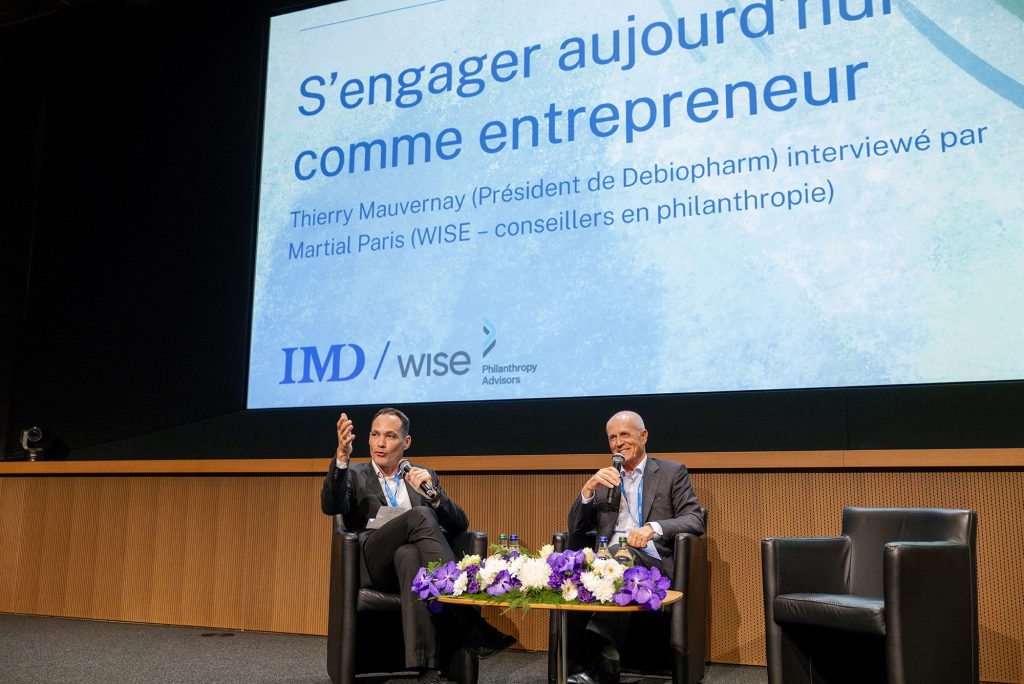On Tuesday September 12, Thierry Mauvernay, President of Debiopharm and of our Foundation, spoke at the IMD on the theme of Family Philanthropy: Challenges and learning in a world in crisis.
In an interview conducted by Martial Paris (WISE), he went back over the history of the Debiopharm Chair created in 2016 and told us about its beginnings.
MP: Why did you create the Debiopharm Chair in Family Philanthropy at the IMD?
TM: Philanthropy has always interested me. My wife, Nadine, and I have always believed that we were fortunate and that we should share it, but in a more professional and consistent way, not just based on personal preferences. This led us to one of our first actions: sponsoring children through “Aide et Action.” To us, good intentions and a backpack are not enough; there needed to be a different approach, one that applies as much professionalism (if not more) to philanthropy as to one’s professional activities.
One day, I was taking a course about Family Office at IMD with my son Cédric, and I asked the participants if they were involved in philanthropy. Almost all of them said yes, so I asked how? The majority replied, “based on personal preferences: a tsunami, an earthquake, etc.”
However, in such cases, a lot of money is often raised, but very little reaches the right places. For instance, it’s said that only 5% of the funds for the earthquake that shook Haiti actually reached its destination. My wife and I couldn’t accept this anymore. So, when the opportunity arose in 2016, with Dominique Turpin, who was the President of IMD at the time, we decided to create this chair to educate donors.
Donating is wonderful, but it can be counterproductive if it’s not done professionally and for the long term.
MP : How do you see the fields covered by the foundation have evolved since its creation more than 10 years ago?
TM: What we’ve tried to do is to be as open and available as possible, according to needs, while maintaining a framework. We are guided by IMPACT , but within a well-defined framework.
Here we have our 4 main axes:
- Lift people out of extreme poverty, from survival to life, notably through entrepreneurship or micro-businesses (Mekong Plus, The clothing bank, etc.).
- Education and training (e.g. Démarche, Radio Begum, etc.)
- Autism (e.g. ASR, Fondation CHUV, La Source, etc.)
- And more recently, humanitarian aid (e.g. Terre des hommes, Mother Sofia, etc.).
We cannot be insensitive to this need for help. We need to adapt to situations, act quickly, keep the idea of impact alive and, if possible, leverage it by motivating other donors.
The needs are enormous, and there will never be enough money to cover them all, which means we have to make very difficult choices and limit ourselves. We can’t do everything, but that doesn’t mean we can’t help out and participate in certain projects.

MP: You often mention the notion of impact in a professional philanthropic approach. Could you provide us two concrete examples?
TM: Yes, I’m pleased to give a few examples, even if it’s a bit reductive:
- Mékong Plus: we’re trying to increase people’s income from $0.50 to $1.40 a day in 3 or 4 years. The first step is to buy 30 to 40 hens to raise them, then have a henhouse, which will lead to the sale of eggs, thus moving from survival to life. From ” What to eat tonight ” to ” the Project of the week “.
- The Clothing bank, Camfed: nano-credit makes it possible to launch a small business. 95% of women use it to earn enough to raise their children.
- Or locally, for example the project with the CHUV Foundation in Lausanne: the aim is to provide personalized support for people with ASD or mental disabilities, a project that will be replicated in the other two cantonal hospitals (the target is over 500 patients a year).
MP: In relation to the world’s needs (global warming, extreme poverty, etc.), haven’t you been tempted to give up considering that philanthropy, even as it becomes more professional, cannot solve all problems?
TM: We must never give up. It’s all too easy to take the easy way out, to think that our action will be too small and insignificant and will have no effect. We must continue and persist in our efforts. I really like the phrase “helping one person is helping humanity”.
We need to be aware that we can’t do everything, that the needs are enormous, that we won’t be able to satisfy every demand, and that resources are limited. If we approach things with a defeatist attitude, we’ll never accomplish anything. I think if there’s a small chance of doing something, even if it’s small, you have to do it.
The event also launched the release of the French edition of the book “Navigateur de philanthropie familiale“, an easy-to-use guide for families to initiate or enhance their giving journey.
